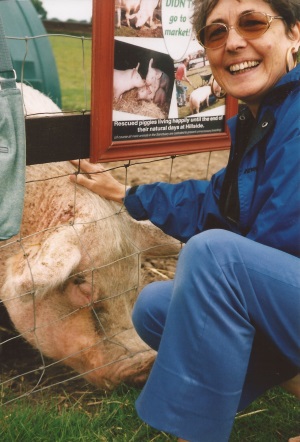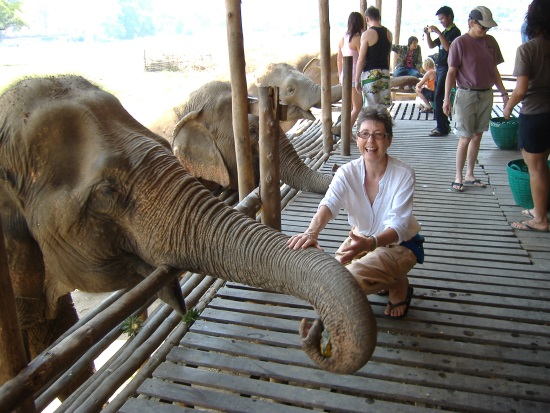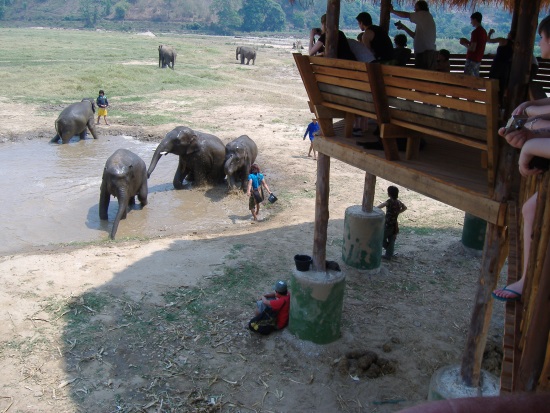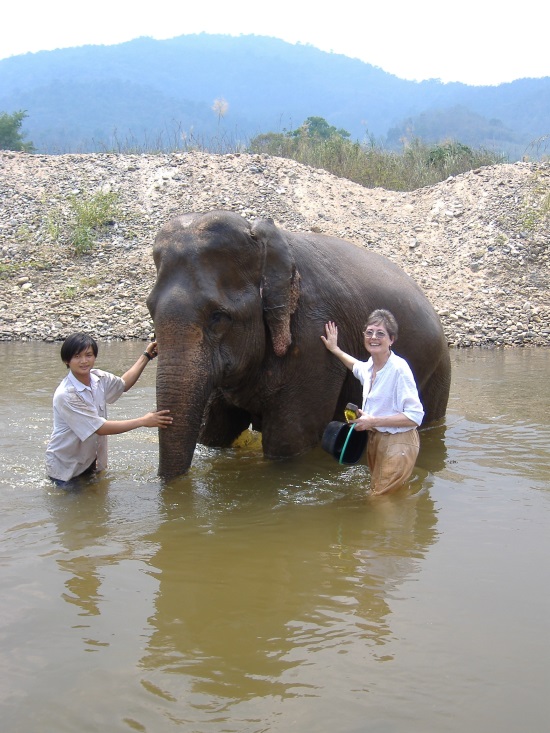Sonia Elizabeth Waddell née Kaulback
(b 19 Mar 1941)
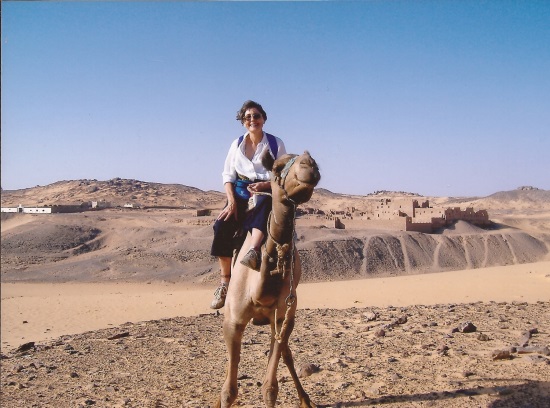
Egypt 2007
(with McLaren)
"We call him McLaren because he go fast like a Mercedes"
An Elephant's Kiss
(This article was first published in Lifescape magazine, Summer issue, 2009)
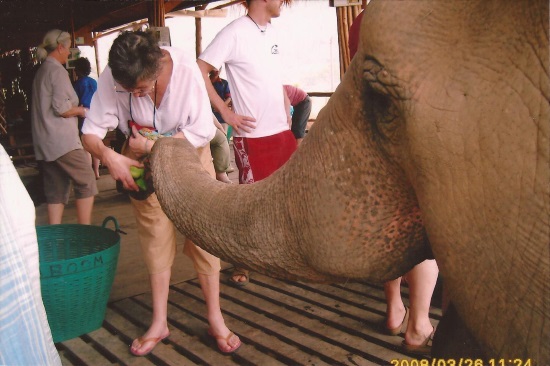
(Bonus picture) Is that a banana or are you just pleased to see me?
Elephants are a symbol of wisdom in Asian cultures. They are one of the most intelligent, sensitive animals on the planet, perhaps even approaching human intelligence and emotion. They can plan ahead, foresee their own mortality, suffer unhappiness and comfort fellow elephants in pain. (They have been known to take the body of a dead villager, and treat it to the same careful funeral rites that they would give to one of their own.) They are profoundly social creatures, and in the wild live within an extended family network over a lifespan as long as 70 years.
Sadly, nowadays human beings and elephants compete more and more for land and food, and the Asian elephant in particular has become an endangered species with perhaps only 30,000 left in the wild (whereas African elephants number about 500,000). In Thailand, from where my husband and I have recently returned, there are only about 1,500 left in the wild, and maybe 3,000 domesticated elephants. When Thailand outlawed rain forest logging in 1990, at least 2,000 elephants were suddenly out of work. Some owners turned to illegal logging, which was far more dangerous. Forcing their animals to work harder, the loggers would prod them with spears and hooks, and feed them food laced with amphetamines. Many elephants became exhausted, drug-addicted and ill. Other owners took their elephants to beg from tourists. This was officially banned in Bangkok but the practice still continues, and currently nearly 300 elephants still beg in the capital's busy streets. They breathe the polluted air, living with noise, bright lights and hot and crowded pavements, and become malnourished, stressed and ill. Other elephants work in entertainment and tourism, carrying people on rides, dancing and performing in shows. The "breaking-in" process by which an elephant becomes domesticated, and is then further trained to perform demeaning and undignified acts, is heartbreakingly cruel.
Elephant Nature Park
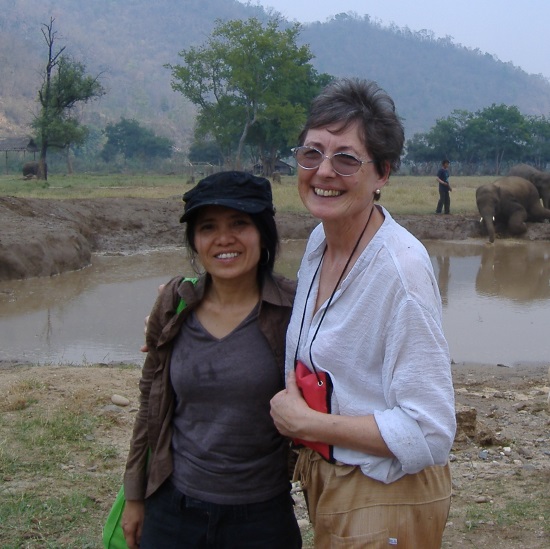
(Bonus Picture) Sonia with Lek1, 2 (7 Apr 2008)
However, there are rays of light, and one in particular comes in the form of a small woman from one of the Thai hill tribes, called Sangduen "Lek" Chailert. Lek means 'small', and she is indeed small but with a mighty heart and enormous will-power. Her love of elephants began when she was a small girl and her grandfather, a Shaman, was given one in payment for his services. As Lek grew up she became more and more aware of the unhappy and abused life suffered by domesticated elephants, and she has made saving them, conservation and teaching her people compassionate methods of training (what she calls Positive Reinforcement) her life's work.
As well as travelling around Thailand teaching the humane treatment of Asian elephants, Lek has founded the Elephant Nature Park, an amazing place comprising forest, open areas and river, which is now home to about 30 rescued elephants. It is one-and-a-half hours' drive from Chiang Mai, Thailand's second city, in the north-west corner of Thailand. Robin (my husband) and I spent some days there, living and working with the elephants, and learning about these wonderful creatures.
Our experience started by being collected from our guest house in Chiang Mai (together with about six others who had planned a day trip to the Park), and being driven through the picturesque Thai countryside, until we reached the Mac Taeng valley and the Elephant Nature Park. It was so exciting to see the lovely wooden buildings and safari-style walkways appearing out of the heat haze with, in the distance, beautiful elephant shapes just doing their own thing! We were almost immediately able to get to know them, as it was soon feeding time and they had lined up by the viewing platform, each by their own basket filled with a selection of pineapples, pumpkins, bananas, cucumbers, and maybe corncobs, waiting to be hand fed. An amazing opportunity for photographs.
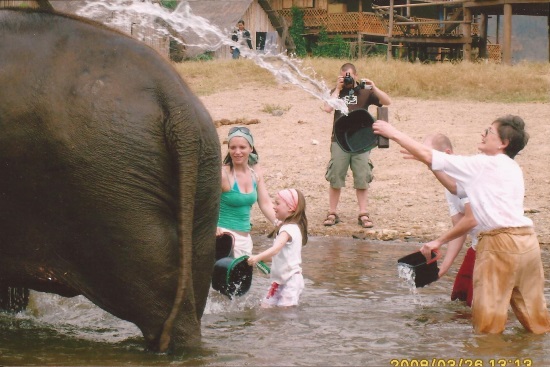
(Bonus picture) Bucket and chuck it!
And then it was lunchtime! During our whole stay the food was never anything but absolutely delicious; a table filled with wonderful curries, salads, and an assortment of mouth-watering Thai dishes, mostly vegetarian, to which we all helped ourselves. (I am vegan, and the cook and other members of the staff were constantly making sure that there were lots of enticing foods for me to choose from.) One of the most memorable experiences at the Elephant Park was bath time when we joined the animals in the river, throwing buckets of water over them and scrubbing their thick skins, a sensation which the elephants really enjoyed. Apart from feeding the elephants, bathing them, and just watching them (something you can never tire of), we went walking with them, attended video presentations and talks about elephant conditions in general and Lek's work in particular, did some DIY and other light work, helped to prepare elephant food – and in the evenings played silly games and had fun!
Jokia's story
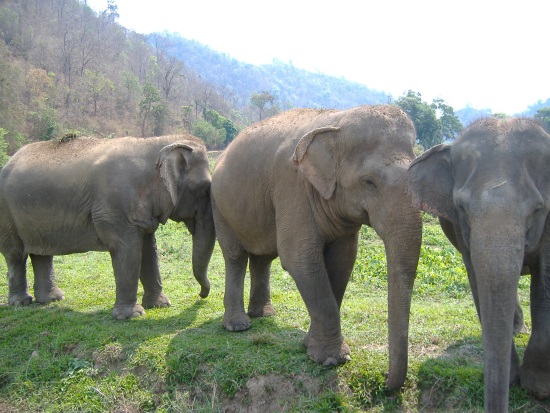
Jokia and Mae Perm at the Park
We learnt the past histories of some of the elephants, before they had been rescued by Lek (who often had to pay as much as one million Baht (£20,000 / US$30,000) – no wonder she is constantly fund-raising.) One ex-circus elephant had a broken shoulder, caused by falling off the small pedestal on which he had been forced to balance; one had had half his foot blown away by a land-mine during illegal logging; one at least had arrived very ill from a drug-overdose; and so the stories went on. I was particularly drawn to Jokia (in fact, I have 'adopted' her and will be receiving regular newsletters). She had been pregnant but was forced to continue working right up until the birth, which took place at the top of a hill up which Jokia had been hauling logs. The baby fell down and died and Jokia naturally mourned its loss (as would you or I) and refused to work. Consequently the mahout shot her in one eye to make her work; later, to make her work even harder, he stabbed her in the other. Lek discovered her and bought her. The happy ending is that Jokia was immediately befriended by another female elephant, Mae Perm; they are now inseparable.
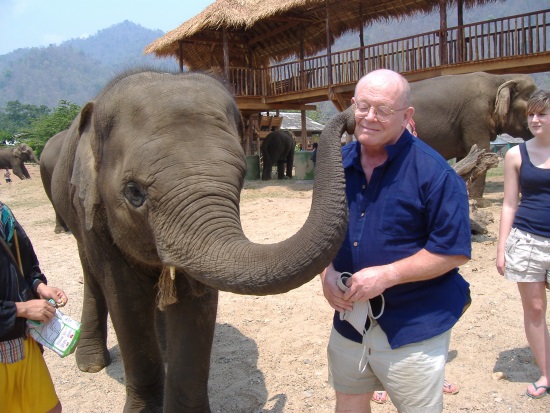
Jungle Boy giving Robin a kiss
Lek's elephants will never work or be abused again. No longer do they have to paint pictures with their trunks, play the drums, or perform demeaning circus tricks. They are not made to carry heavy benches on their backs (which can deform or even break an elephant's spine), and they are no longer forced into submission with cruel implements such as "the hook". They can now live the life of an elephant, roaming unfettered, browsing and bathing, and socialising in their family groups.
Lek has one important message for all visitors to Thailand: please do not go to elephant camps or shows where the animals are cruelly forced to produce paintings, play music, or perform tricks. And of course never, never buy ivory. Instead I personally would like to suggest that you go and visit the Elephant Nature Park, support its work and see these wonderful creatures for yourselves!
You can read more about Jokia and other elephants at elephantnaturepark.org/
All Creatures Great and Small

Letter to The Times 31 October 2024
School Talks
(This article is also available at the Quaker Concern for Animals (QCA) website.)
I have been an Animal Aid School Speaker for some years, since I retired from my physiotherapy work in the NHS. It's a brilliant thing to do, giving one an immense amount of satisfaction, and the feeling of doing something worthwhile. Mark you, my stress levels are always pretty high beforehand, that keeps me going, but I really enjoy things once I get started – and when it's all over I'm on an absolute high.
The topics we speakers are asked to cover are general animal rights, factory farming, vegetarianism and its many health benefits, vivisection (talks are always geared to the age group of the students we are talking to), and currently the badger cull, but we also touch on climate change, the role of the rainforests, third world problems, pollution of land and sea and more. Last autumn term was an especially busy one for me, with an average of one school talk a week, and there was one period when I did three presentations in five days. The smallest number I have ever been asked to address was a group of eight 6th formers, while the largest was 300 primary school children; generally it's somewhere in between. With primary schools, of course, I show nothing contentious or harrowing, but instead a delightful and humorous video of animal footage, wild and domestic, and their various interactions with us. I remember one little girl anxiously asking me if animals got married! – It was a faith school so I had to be careful in my reply, but I told her that if they loved each other then it counted as marriage!
I remember doing a presentation to one school assembly of 280 11-12 year-olds on factory farming and vegetarianism. It went well, but I particularly enjoyed the questions the students put to me at the end! The questions covered important topics such as 'Would you mind being the only vegetarian in a restaurant?' I told them 'no, it might give the meat-eaters ideas on how delicious veggie food could be'. 'If there were no vegetables (!!!), would you go into a KFC?' I told them the sad facts about Kentucky Fried Chicken and its lack of animal ethics, and said it would do me no harm to miss a meal occasionally. My favourite comment came from one young man who, with real anguish, asked 'But what about chicken soup!!?'
Generally the schools I visit are up to one-and-a-half hours' drive away, which can take planning, especially in the morning rush-hour. I always allow plenty of time because on one occasion I locked myself out of my car in the school car-park, with all my notes and DVD's still in the car. Fortunately, the timely arrival of the A.A. enabled me to make it to the class-room just in time.
If the talk covers vegetarianism, I often take vegetarian/vegan food, especially if it's near lunch-time, always including my home-made vegan 'soss' rolls, which are amazingly popular. And, of course, there is lots of brilliant Animal Aid literature, which I encourage the students to help themselves to afterwards.
The reaction from the talks is often heart-warming: big hugs from some of the girls, cards sent me later on with lovely messages, and drawings from the little ones.

(Click here to see messages)

(Click here to see messages)
And it is always nice to be asked back again the following year! (Please click here for a list of schools at which I have given talks so far.) If you are interested in giving talks to young people, please visit the Animal Aid website.
#gettinnekkid
Sonia's whole-hearted commitment to the causes she supports is totally uncompromising, and sometimes the more conservative corner of the household practically chokes on his breakfast kipper when news items such as this crop up (OMG, I think, there goes the neighbourhood):

(Reading Midweek Chronicle)
And an on-line local source added fuel to the fire:
Tilehurst pensioner strips off in nearly-nude animal rights protest
By Linda Fort
Sonia Waddell, 73, of T-----t Road, was one of the People for Ethical Treatment of Animals demonstrators who lay in a heap in the square on World Vegan Day

Sonia Waddell strips off for the PETA protest in Trafalgar Square
A retired physiotherapist from Tilehurst joined 100 protesters in a "nearly nude" animal welfare protest in Trafalgar Square. Sonia Waddell, 73, of T-----t Road, was one of the PETA (People for Ethical Treatment of Animals) demonstrators who laid in a heap in the square on World Vegan Day, Saturday, November 1.
The protest was organised to encourage passers-by to have compassion for the billions of animals slaughtered for their flesh as part of the meat and fishing industries every year.
Mrs Waddell said: "Animals feel pain, fear, love and joy, just as humans do, yet billions of them are killed every year for products that are poisoning the environment and making humans sick."
She added: "The following weekend was so cold but on the day of our demonstration the sun was shining.
"I was so embarrassed to begin with but, after a while, surrounded by such wonderful people I felt quite comfortable.
"I didn't tell my husband about it until the weekend before."

Humankindness for the voiceless victims of humankind
Eat and Let Live
When Sonia was growing up in Bantry after the war, food of every kind was freely available in southern Ireland, by then the Republic of Ireland of course. Meat, fish, dairy produce, fruit and vegetables, were all in abundance. And English holiday-makers in Ireland would very much have appreciated the contrast with the strictly-rationed regime in the rest of the British Isles.
(While (West) Germany, our principal antagonist, ended rationing on 18 Jan 1950, fourteen years of food rationing in Britain only ended at midnight on 4 July 1954, when restrictions on the sale and purchase of meat and bacon were lifted, nine years after the end of the war. Rationing in Soviet-controlled East Germany lasted until late May 1958. One might call these economic contrasts ‘food for thought'.)
But after moving to London in 1958, and in the decades that followed, and that continue to follow of course, Sonia began to think about the deeper implications of the food one ate, as regards the welfare of the fish, the fowl and the farm animals, and also the impact on the world around us of the ever-intensifying farming and fishing industries, and, more personally of course, the effects on ones own health of all the foodstuffs traditionally regarded as "good for us".
And so she became vegetarian, quite early on, when there was only one vegetarian restaurant in the whole of London. Now there are thousands, of course, either purely vegetarian, or offering a decent range of vegetarian options.
In due course, however, the evils of the intensive dairy and egg-producing industries, and the indiscriminate use of agro-chemicals, genetic modification, hormones and antibiotics, and goodness knows what else, moved her firmly onwards to veganism.
Most us eat in far more often than out, unless we're Giles Coren of course, and that means somebody has to cook – and he or she who wields the skillet rules the roost as regards the menu options. I won't labour the point, but be assured that Sonia has honed all these recipes (and many others) to perfection over the years, and I have enjoyed every single one every single time.
Hopefully many more of her recipes will emerge shyly into the spotlight in due course. Please be assured that every recipe is totally vegan even if they just say vegetarian.
Rush to judgement
One evening in 1980 or thereabouts, there was a knock at the door, and a policeman on the doorstep. He flashed his ID and enquired in a businesslike way whether this was the habitation of a Mrs Waddle, and I had to admit that someone approximating to that name was indeed resident. In he came and announced that a local lollipop lady had accused Mrs Waddle of reckless driving the previous morning, endangering both herself and the tinies she'd been escorting across the road. She'd apparently said Mrs Waddle had driven straight at them and they'd all had to jump for their lives!
Sonia had often remarked on how grumpy and officious that particular individual was on the daily school run with our elder offspring, but was naturally most indignant at the accusation. Despite her vigorous protests, that she had simply slowed down to walking speed, the majesty of the law eventually had its unjust way, and she was fined, and awarded a number of penalty points, for the lesser charge of driving without due care and attention.
I thought the whole thing was rather hilarious, and promptly composed the following ditty, to be sung in a mournful Welsh accent to the tune of Down Yonder Green Valley:
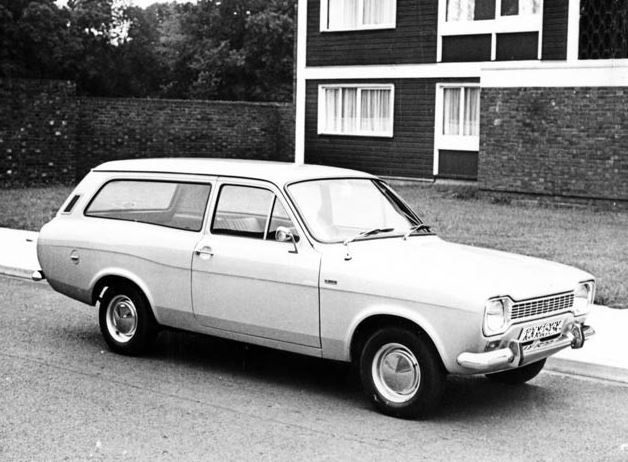
|
In yonder white Escort At lollipop ladies And groups of small children I recklessly drove. They jumped to the pavement And stared in amazement As driving at walking pace I thundered by. I'm sorry oh so sorry For their anguish and worry For never did I imagine It would all end in tears. I don't think I'll bother To knock down another For I'm going to prison For twenty five years. |
Mrs Waddle was Not Amused!


